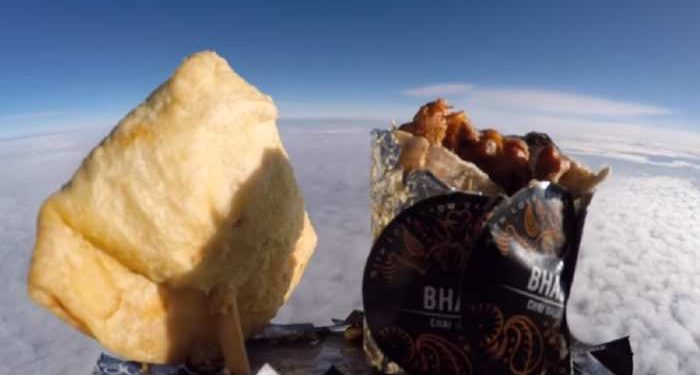Melvin Durai
An Indian restaurant in the city of Bath, England, made news recently when it sent a samosa into space. The samosa went all the way to a foreign land and was enjoyed by a samosa-loving creature of some sort.
The samosa was sent into space by a restaurant called Chai Walla and its owner, Niraj Gadher, according to a report by Somerset Live, a news site that covers Bath, the cleanest city in England.
Chai Walla has been ranked as one of the best restaurants in Bath, but that distinction was not enough for Gadher. He apparently also wanted it to be recognised as the only restaurant in the world with a “samosa space program.”
As he told Somerset Live, “I said as a joke once that I would send a samosa into space, and then I thought during this bleak time we could all use a reason to laugh.”
Gadher used large weather balloons filled with helium to send a package holding the samosa, as well as a wrap, into the atmosphere. It took three attempts to send the samosa off on its mission, as you will undoubtedly read one day in “The History of Samosas in Space.”
Gadher attached a GoPro video camera and a GPS tracker to the package, so if you watch the video on YouTube, you can actually see the samosa looking down on the earth like some sort of Samosa God.
The balloons lifted the samosa so high that in one of the shots from the video camera, you can see a plane in the background. I wonder if any eagle-eyed passengers spotted it.
Husband: “Did you see that, Jenny?”
Wife: “See what, Bob?”
Husband: “A samosa — right beside the clouds.”
Wife: “You silly man. You need to stop drinking so much!”
The samosa came so close to the plane that the Civil Aviation Authority (CAA) of the United Kingdom almost recorded the first samosa-plane collision in history.
Thankfully the samosa made its way safely across the English Channel, before landing in a field in Caix, Northern France. Gadher pinpointed its location using the GPS tracker and turned to social media for help. An Instagram user named Axel Mathon drove to the location and found the package. The camera was still there, but the samosa and wrap had disappeared, presumably eaten by an animal of some sort—a hungry animal whose prayers had been answered by the Samosa God.
It’s important to note that this wasn’t the first time that a samosa has travelled to space. Indian-American astronaut Sunita Williams took a samosa with her on her expedition to the International Space Station in 2012. But Chai Walla did become the first restaurant to send a samosa into space. I hope many more restaurants launch samosas into space, partly because one of these samosas may eventually find its way to my home. If I spot a samosa landing nearby, I promise to share it with every member of my family who can name five cricketers.
Samosas are the greatest snack in the world, popular in so many countries. They’re especially popular in the UK, where they’re not only being launched into space but also being made in huge sizes. About three years ago, a humanitarian charity called Muslim Aid UK made a 153.1 kg samosa, setting a Guinness World Record for the world’s largest samosa.
I always thought that samosas originated in India, but according to Wikipedia, they originated in the Middle East and were brought to the Indian subcontinent in the 13th or 14th century by traders from Central Asia. I’m not sure how samosas made their way to the UK, but it’s quite likely that one of Niraj Gadher’s ancestors launched them into space from India.






































